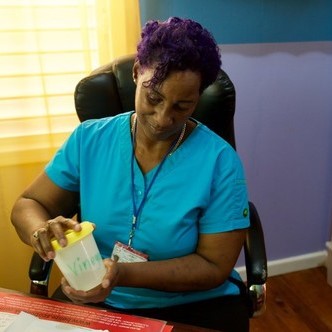Dangriga is a picturesque, quiet town. Nestled on the Belizean coast, its stunning Caribbean beaches could easily be found on a holiday postcards or computer screensaver. Many of the roads are unpaved, lined with potholes and makeshift irrigation canals. It’s not uncommon to see a desolate shanty, balancing precariously on stilts, next to a Spanish villa.
The people in Dangriga are overwhelmingly friendly, though there aren’t many on the streets. Children play on the local soccer pitch in front of crystal-clear, turquoise water. Take a closer look, though, and you’ll find trash lining the manicured field.
Dangriga is filled with this type of juxtaposition. Kindness, warmth, and beauty clashes with an overwhelming feeling of nostalgia, poverty, and violence.
Dangriga has one of the highest teen pregnancy rates in the country, a statistic that reveals a hard truth exasperated by lack of running water and access to education. Gender-based violence, abject poverty, and HIV/AIDS rates are high.
But at the end of one dirt road is a wooden house, mounted on stilts, where a woman greets you with an open door and a smile.
Meet Desiree, head nurse at the Belize Family Life Association’s (BFLA) Dangriga clinic. BFLA is the only non-profit, nongovernmental organization that focuses exclusively on sexual and reproductive health and rights in the country.
Desiree is as warm as she is welcoming, and her purple hair and demure smile make you feel as if you’re in the presence of somebody you can trust.
What made you want to become a nurse?
“I followed in my mom’s footsteps. She was in the medical field. She used to take us to work, and then, you know, you get that passion, so I told myself, “I want to be like that.” I went to school for business but kept coming back to science I’ve now been a nurse for 29 years, and work hard to be a client-centered type of nurse.
Why are you committed to this work and to being a client-centered nurse?
Caring for people – especially young people—is my passion. Young people are my passion. I like to see them with high self-esteem, and that’s one of the things that pushes me to come to work every day. But here in Dangriga, we face a lot of issues. Today, teenage pregnancy remains very high. It has to do with a lack of jobs, a lack of positive outlets for young persons, lack of self-esteem, and a lack of access to sexuality education. Access to education in general is sometimes limited because of the cost. There’s alcohol and drugs and peer pressure to “fit in.” Some think, if my friend has a child, then I want to experience the same thing. So, we work to provide education so young people can make informed choices.
What are some of the myths you hear about sexual and reproductive health?
There are different types of misinformation. For instance, we try to educate young persons about family planning. Some are worried that birth control will make you fat, or that you won’t be able to have children later in life. Some people believe it’s okay for your partner to hit you because it’s a sign of love. My job – all of our jobs – is to share the truth and break these myths apart.
What’s the hardest part of your job?
I have close relationships with my clients. Sometimes they come by just to talk. But what is unbearable is when a young person takes an HIV test for the first time and it’s positive. That’s one of the things that is hard for me. And sometimes you get the sense that the partner already knew that they had it yet didn’t communicate their status openly. We have to change the culture and comfort around having this difficult conversations about sexual health and rights.
How do you stay positive, despite the challenges?
I think that if I come into contact with one person and make a difference, I’ve done a lot.
